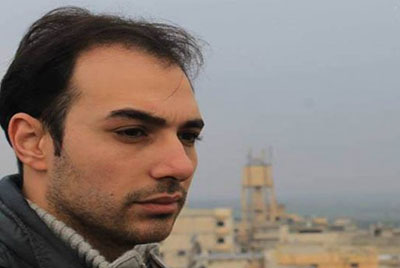It is increasingly difficult to document violations against the press in Syria, let alone hold those responsible to account. It has always been hard to verify facts within the country. But now, the sheer number of violations and the expanding list of violators have become admittedly overwhelming.
Take, for example, the terrible experience of a single news outlet: the local opposition TV station Orient News. In the past four weeks alone, four of their journalists were abducted, one was killed, and another four were injured, according to officials from the station. The chronicle of attacks on Orient News is a tragic microcosm of threats facing the media in Syria as a whole.
On Thursday, a group of armed men raided Orient News’ office in the rebel-controlled countryside north of Aleppo. Correspondent Obaida Batal, broadcast engineer Hussam Nidham al-Deen, and assistant engineer Aboud al-Atiq were all taken hostage. The gunmen looted the station, stealing the channel’s broadcast car and photographic equipment. Mohanad al-Sayed Ali, the station’s head of news reporters, told me that he does not know who kidnapped the journalists or why.
The “why” is particularly hard to decipher these days, with battle lines constantly shifting and multiple groups apparently willing to kidnap journalists–whether in attempt to silence critical reporting or extort ransom, or out of simple xenophobia. More than a dozen local and international journalists are currently missing in Syria, according to CPJ research.
Why” also applies to another missing journalist who has worked for Orient News. On June 26, photographer Aboud Haddad was kidnapped in the Idlib province city of Atma, close to the Turkish border. Ali and the regional press freedom group SKeyes say he was kidnapped by a militia from an al-Qaeda affiliate, Islamic State of Iraq and Sham. SKeyes, citing a post on a popular Facebook page covering the civil war, suggests Haddad was detained after a disagreement with the Islamist militia, but Ali says the channel still does not know why Haddad was taken.
Abductions have not been the only threat to Orient’s journalists this month. On July 5, Fidaa al-Baali succumbed to shrapnel wounds he sustained in government shelling of the Damascus neighbourhood of Qaboun in early June, according to news reports. Al-Baali, also known as Mohamed Moaz, had been in a coma for weeks before passing away.
As The New York Times reported, “Al-Baali never stopped trying to document the conflict–not when his brother, a rebel fighter, died in battle; not when security officials, trying to pressure him, arrested his father; not even when the rebel battalion he was embedded with unleashed a mortar attack that killed his fiancée.”
Al-Baali joins 50 journalist colleagues who have been killed covering the Syrian uprising and civil war, according to CPJ research. Almost 90% of the victims were local journalists like al-Baali.
This month another four Orient News journalists narrowly escaped joining those grim statistics. On Monday, Hadi al-Monajed was injured during shelling of Free Syrian Army positions by government forces near the Damascus International Airport. His foot and hand were broken, Ali said, but he still published his report of rebels celebrating after gaining ground in the strategic area of Al-Ghizlaniyah.
On Sunday, Beshank Aalo was seriously injured while covering the shelling of the Sheikh Maksoud neighborhood in Aleppo. He is at a makeshift civilian hospital, and Ali worries that Aalo’s leg may need to be amputated.
On July 23, Ammar Dendish was covering a battle in Jisr al-Shughur in the northern province of Idlib when a helicopter dropped an explosive. The bomb exploded in the air, shattering the windows of Dendish’s car, but causing the journalist only minor injuries, Dendish said in a Facebook post. His report from the day shows rebels firing mortars at government positions.
On July 2, Yaman al-Sayyid was injured filming the shelling of the Damascus suburb of Kafr Batna. A picture posted by local activists in Kafr Batna shows a bloodied al-Sayyid lying on the ground with a bandaged right arm. Two days later, al-Sayyid could be found reporting on clashes in Barza, north of Damascus, with his arm in a sling.
In a statement on the recent attacks against Orient News employees, the channel’s general manager, Ghassan Aboud, pledged what his staff has already proven: “These reprehensible actions will not stop the group from performing its duty to the Syrian people.”
These violations against the press are the experience of just a few journalists from just one station over just one month in a war that has seen too many journalists from too many outlets killed, injured, and abducted over too many months.
The challenges to documenting all these violations are immense, but not so immense as the challenges of reporting from Syria in the first place. And yet, journalists from all sides continue to rise to those challenges at immense personal risk.
UPDATE: This blog has been modified to reflect the correct spelling of Ammar Dendish’s name.
